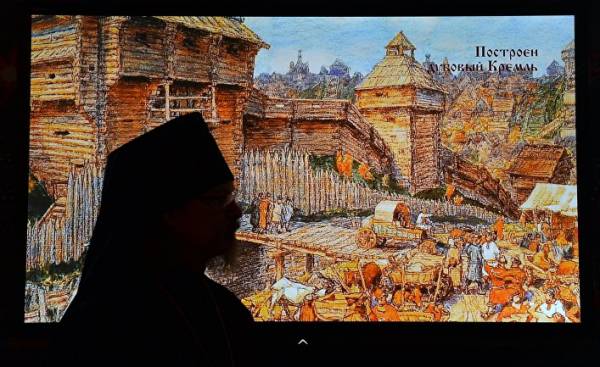
775 years ago, 12 (April 5), 1242, Novgorod army under the command of 20-year-old Prince Alexander Nevsky defeated the Livonian order forces in the battle of lake Peipus, known as the battle of the Ice.
In the XIII century, the difference between the dates according to the Julian and the Gregorian calendar was seven days, not 13 as it is now, but modern Russian legislators did not take into account this nuance and set the day of military glory on April 18.
In 1547 the Prince was canonized, and in 2008, according to the online poll voted the greatest Russian of all time. He is considered the patron Saint of Russian diplomacy and of the security services. The order of Alexander Nevsky — the only thing that existed in the Russian Empire and the Soviet Union, and Russian Federation.
St. Petersburg historian Klim Zhukov called on the Ice the most famous and most mythologized event in the Russian middle Ages.
1.Trelowarren knights fell through the ice, and the main finding generalship of Alexander Nevsky was the fact that he lured them there
The final part of the battle really took place on the ice of lake Chud, which, according to the Novgorod chronicler, “was covered with blood.” The Russians pursued the enemy seven miles.
However, neither of Novgorod and Vladimir Laurentian chronicle or “the Life of Alexander Nevsky” or order “Chronicle of the Grand masters” and “Elder Livonian rhymed chronicle” not to mention that someone fell through the ice.
Assigned to the Russian Prince of the creators of the film “Alexander Nevsky” phrase: “the German are heavier than us, and under him breaks”, could not be in reality because the weapons and armour of Russian warriors weighed less. This, incidentally, is seen in the movie, who consulted the best historians of the time.
The impression that knights clad in steel from head to toe, created mostly deaf hats-bucket. But top Russian shyshaky with folding frames (in that fighting on the screen Alexander performed by Nikolai Cherkasov), had approximately the same weight.
Good tactical move Nevsky was that he did not copy the build of the knights advancing “pig”, and left in the centre a barrier of archers showered the enemy with arrows, and concentrated the main forces on the flanks and in reserve.
2. The ice decisively and forever changed geostrategic situation in the North-West of Russia
In Soviet historiography, the number of troops on lake Peipsi was estimated at 10-12 thousand fighters of the order and 15-17 thousand of Novgorod, which is comparable to the battle of Poitiers and the battle of Grunwald, the largest battle of the middle Ages.
However, these figures are estimates and not documented, and the scale of the losses forces them to doubt.
According to reliable sources, the order was lost in that battle 26, the knights (20 dead and six prisoners). Were also killed 400 and captured about 50 people “Chud” (the Union of Estonian infantry), who “were bare beside the horses.”
About the Russian losses were said dully: “Many brave soldiers fell”.
Given the fact that the battles of that era, the main contents of which were melee massacre, died a quarter of participants, and losing parties and more, we have to assume that in the battle came together several times less soldiers than was assumed.
The victory on lake Peipus was of psychological importance, because it was won during the weakening and humiliation of Russia from what happened five years earlier the Mongol defeat, but nothing fundamentally changed.
After 10 years, the order once again temporarily captured Pskov, but only between him and the Russians were over 30 large and small wars, the last one under Ivan the terrible.
A leading Russian expert on the middle Ages Mikhail Tikhomirov considered the Ice of tremendous importance, but he stressed that the fight lasted a long time. The film “Alexander Nevsky”, which he himself advised, Tikhomirov called a “mockery of history”.
While the main subject of regional policy and for the order, and for the Russian was a confrontation not with each other, and with Lithuania.
3. Alexander Nevsky fought the Germans
Not all of the “order of Lord” were ethnic Germans, and they were inspired by national and religious idea.
Modern researcher Andrei Burovskii indicates that the power and danger of the order was that he was constantly feeding in the face of the younger sons of noble families, fanatics and adventurers from all over Europe, and quickly recover from shocks, which the normal state would not have survived.
Sergei Solovyov reported that Alexander and his colleagues called his enemies “Romans”, and fought not with germantwon, and Catholicism.
“The victory on the Neva is considered as the triumph of Orthodoxy over Catholicism” — agrees Sergey Platonov.
The idea of “Teutonic dogs” eternally irreconcilable and hostile to Russia, inspired, again, by the film of Sergei Eisenstein, highly talented, but focused on political issues of the day 1930-ies.
4. Alexander Nevsky and his soldiers defeated the hitherto invincible formidable enemy
Alexander’s father Yaroslav Vsevolodovich, Prince of Novgorod, later Grand Prince of Vladimir, in 1234, on the river Movie under the Dorpat struck to the order of a defeat not less severe than in lake Peipsi.
In 1236 this order was destroyed by the Lithuanians under Siauliai, losing about a third of the knights, headed by the Grand master.
5. The order was continuously implemented aggressive Drang nach Osten, a Russian was being held back
In the conflict that preceded the battle of the Ice, the knights “played white”, but in General the Russian were not offend the weak side. The rivals began fighting, when the situation was favorable, and the others had to attack and fight back, the fight was a long time with varying success.
The same Yaroslav Vsevolodovich three — 1223-m, 1228 and 1233 was first marched against the order.
The names of the places of the battles of Dorpat (Yuriev, now Tartu), Koknese (Kukeynos), Rakvere (Recover) — suggests that the main battleground and bone of contention was modern Estonia. Livonians and Novgorod divided foreign land, and the indigenous inhabitants of their desires, did not ask.
6. The ice and the battle of the Neva with the Swedes in 1240 — the main acts of the Prince, the defender of the Russian land
Generalship of Alexander Nevsky career ended at 24. Further, he fought only with their compatriots, suppressing the speech of anti-Horde in Suzdal, Novgorod and other cities of Russia.
Before and after the victory on lake Peipus Novgorod said to the Prince “in the clear”, obviously not considering it such an important merit to forgive authoritarian tendencies.
The ice was not perceived by contemporaries as an event of great importance, says a specialist in Russian Chronicles, Igor Danilevsky.
Novgorod and the Laurentian chronicle and the classics of the Russian historical science Nikolai Karamzin, Sergei Soloviev and Nikolai Kostomarov spoke about it briefly and without emotion, and Vasily Klyuchevsky and Mikhail Pokrovsky did not mention in their works.
“Alexander was only doing what many defenders of Novgorod and Pskov did before and after him,” writes Oxford University Professor John fennel.
A key role of Alexander Nevsky in the fate of Russia is in another.
In 1250 years, becoming the Grand Prince of Vladimir, he made a historic choice in favor of submission to the Horde, and borrowing its political model.
The split raised the princely family: Alexander followed his father Yaroslav and went with his brother Andrew and his son Basil.
The consequences of this decision affect the present day. Alexander Nevsky can be considered the father of the Russian autocracy and anti-Westernism.
Some historians claim that he had no choice, resistance in the mid-thirteenth century, would lead to the nullification of the nation by the roots, and remind you that Prince Daniil Galitsky, brought to its Alliance with the West against the Tatars, effective assistance is not received, and in the end still went cap in hand to the Barn.
Others point out that the Grand Duchy of Lithuania and its Slavic subjects, the ancestors of modern Belarusians and Ukrainians, crushed the supposedly invincible Tatars and without the support of Western Europe.
Fans of Alexander Nevsky are sure that it is with a heavy heart, bent back and repressed the honest but short-sighted people, dreaming of the bright hour of liberation. Opponents believe that he most wanted to be an autocrat, and not so much the Tartars used him as he used them to strengthen their own power.







